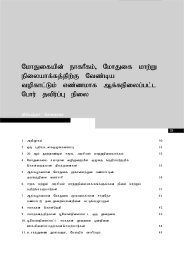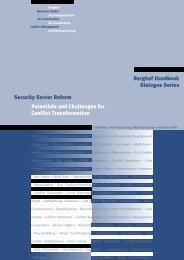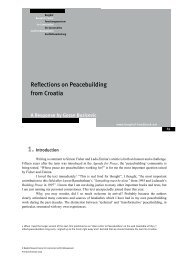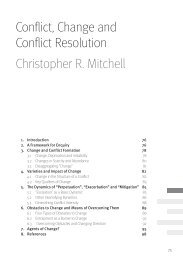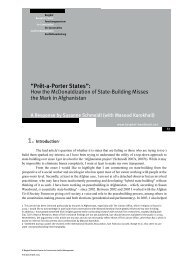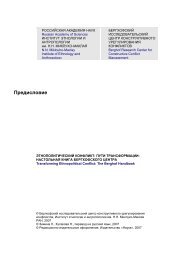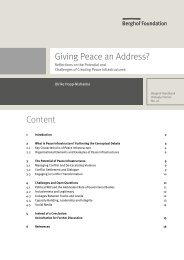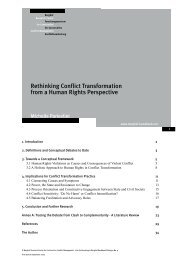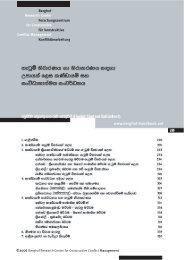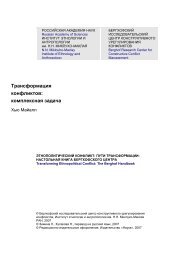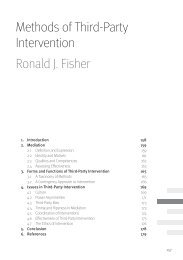Human rights and conflict transformation: The challenges of just peace
Human rights and conflict transformation: The challenges of just peace
Human rights and conflict transformation: The challenges of just peace
Create successful ePaper yourself
Turn your PDF publications into a flip-book with our unique Google optimized e-Paper software.
20<br />
Bergh<strong>of</strong> H<strong>and</strong>book Dialogue No. 9<br />
work <strong>of</strong> Burton (1990), Azar (1990) <strong>and</strong> Galtung <strong>and</strong> Wirak (1977). It posits a close link between<br />
human <strong>rights</strong> <strong>and</strong> basic human needs, arguing that the denial <strong>of</strong> <strong>rights</strong> implies a frustration <strong>of</strong><br />
needs related to identity, welfare, freedom <strong>and</strong> security, which are fundamental for human survival,<br />
subsistence <strong>and</strong> development. Rights are a means to satisfy needs; they are “an instrument <strong>of</strong><br />
individual <strong>and</strong> collective struggle to protect core interests” (Osaghae 1996, 72). If <strong>rights</strong> are denied,<br />
needs are frustrated, which creates a potential for violent <strong>conflict</strong> as people seek to find ways to<br />
address their basic needs, since these are non-negotiable (Parlevliet 2002, 16-19).<br />
This needs-based explanation does not suggest that violations <strong>of</strong> human <strong>rights</strong> will<br />
necessarily cause the outbreak <strong>of</strong> violence or that they constitute the sole cause <strong>of</strong> any particular<br />
(violent) <strong>conflict</strong>. <strong>The</strong> role <strong>of</strong> the state <strong>and</strong> issues <strong>of</strong> governance are key. <strong>The</strong> way the state is organised<br />
<strong>and</strong> functions determines in large part whether needs are satisfied or frustrated over the long term:<br />
it allows or denies individuals <strong>and</strong> groups access to the resources, opportunities <strong>and</strong> processes they<br />
need to address their needs – or to raise concern about the frustration <strong>of</strong> their needs (Azar 1990, 10).<br />
A human <strong>rights</strong> perspective on <strong>conflict</strong> <strong>transformation</strong> thus underscores the “centrality <strong>and</strong> primacy<br />
<strong>of</strong> the political” (Clements 2004, 3).<br />
In general, a state’s inability to protect <strong>rights</strong> may be due to, for example, weak state<br />
structures <strong>and</strong> lack <strong>of</strong> resources, both material <strong>and</strong> moral (legitimacy). Yet a state’s unwillingness<br />
relates to how power is divided in society <strong>and</strong> how a certain way <strong>of</strong> functioning <strong>and</strong> making decisions<br />
may be to the advantage <strong>of</strong> some while being at the expense <strong>of</strong> others. It may also have a cultural<br />
dimension, if strong belief systems exist in society about who is deemed superior <strong>and</strong> fit to govern <strong>and</strong><br />
who is not, <strong>and</strong> whose interests should be protected or can be ignored. Alternatively – or additionally<br />
– the dominant political culture may revolve around the notion <strong>of</strong> ‘winner-takes-all’/‘your gain is my<br />
loss’ <strong>and</strong> may as such be averse to accommodating diverse interests <strong>and</strong> collaborating with opponents.<br />
Especially in contexts where a particular group or elite has captured the state <strong>and</strong> government<br />
institutions, this means that calls for wider political participation, greater access to economic resources<br />
<strong>and</strong> opportunities or self-determination – all <strong>of</strong> which can be framed in terms <strong>of</strong> <strong>rights</strong> <strong>and</strong> relate<br />
to needs <strong>of</strong> identity, access <strong>and</strong> security – are likely to be perceived as a threat by those in power,<br />
limiting the potential for accommodation. In Nepal, for instance, the inability <strong>and</strong> unwillingness <strong>of</strong><br />
the state – both authoritarian <strong>and</strong> democratic – to ensure the <strong>rights</strong> <strong>and</strong> accommodate the interests <strong>of</strong><br />
marginalised groups <strong>and</strong> political opponents, <strong>and</strong> address widespread poverty <strong>and</strong> exclusion, has been<br />
a main cause <strong>of</strong> (violent) <strong>conflict</strong>. Excluded groups have had few political avenues at their disposal<br />
to express dissent due to lack <strong>of</strong> representation embedded in the nature <strong>of</strong> the political system <strong>and</strong> the<br />
intense stratification <strong>of</strong> Nepali society. Access to <strong>just</strong>ice was almost non-existent, <strong>and</strong> law enforcement<br />
was politicised, corrupt, violent <strong>and</strong> replicated societal discrimination.<br />
In such instances <strong>of</strong> discontent, the choices made by the state, communal groups <strong>and</strong><br />
political opponents about how to engage with one another, help determine whether or not societal<br />
tensions around denial <strong>of</strong> <strong>rights</strong>, frustration <strong>of</strong> needs <strong>and</strong> the (in)adequacy <strong>of</strong> political, legal, economic<br />
<strong>and</strong> social institutions, will evolve into violence (Miall 2004, 5; Azar 1990). In an in-depth study<br />
<strong>of</strong> whether human <strong>rights</strong> violations cause internal <strong>conflict</strong>, for example, Thoms <strong>and</strong> Ron find that<br />
state violations <strong>of</strong> civil <strong>and</strong> political <strong>rights</strong> “provide a clear link to escalation” <strong>and</strong> argue that “state<br />
repression is a major risk factor because it can transform latent grievances into active antagonisms,<br />
providing the persecuted with strong motivations for violence” (2007, 695). If, on the other h<strong>and</strong>,<br />
communal groups or political opponents adopt a strategy <strong>of</strong> violent rebellion, this is also likely to<br />
result in a destructive cycle, as it may prompt government repression <strong>and</strong> <strong>conflict</strong> escalation.<br />
Various factors influence the choices made <strong>and</strong> strategies adopted by political actors,<br />
including structural, historical, cultural, but also geographic <strong>and</strong> economic ones, which impact






